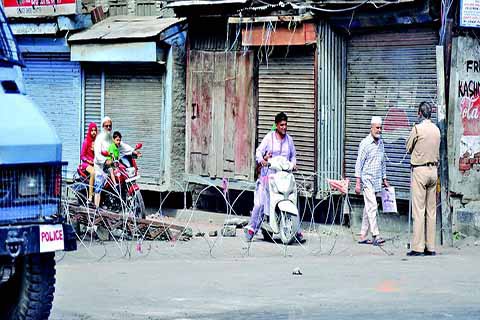 With unending curfew, restrictions and shutdown for the last two months, Shaher-e-Khaas has been turned into a ghost town where enforced desolation during the day has become a new normal and around a million residents continue to suffer from numerous seen and unseen miseries.
With unending curfew, restrictions and shutdown for the last two months, Shaher-e-Khaas has been turned into a ghost town where enforced desolation during the day has become a new normal and around a million residents continue to suffer from numerous seen and unseen miseries.
The people are adjusting their daily routine to best suit the situation as they know the consequences of defying curfew. Forces arrive early in the morning in the city and seal the roads, with directions to the local population to stay indoors.
“Its announcement every morning is abhorrent. It turns the entire city into a jail for local population,” said Danish Ahmad, a resident of Nawa Kadal.
In the evening, deployment is withdrawn at 6pm and clashes begin. “As the deployment is in process to return to their respective stations, the youth come out and chase the deployment. It results in clashes between youth and the forces every evening,” said Omar Ahmad, a local businessman.
Amid pro-freedom slogans, teargas shelling, pellets and aerial firing goes on till late into the evening. “Women inside their homes who hear the sounds of firing of pellets and bullets raise hands and pray for safety of youth who engage forces in ding dong battles,” said Ahmad.
“When youth engage forces in battles, the local shops and street vendors don’t function, even during the relaxation period announced by joint resistance camp,” said Bashir Ahmad, a local at Nowhatta.
The situation forces people to stock essentials for several days whenever they get a chance.
“We purchase the veggies, cereals and whatever is available in the evening, We buy enough to store it for another few days as we are not sure whether it would be available the following day or not,” said Ghulam Qadir, a local.
The deployment around the police stations in Shaher-e-Khaas remains in place round the clock. “This is to ward off the attacks on police stations by the protesters. No one is allowed to move near the police station,” said local residents.
The curfews have also changed the schedule of shopkeepers particularly those selling vegetables, bread and milk. “It is only during night hours that we get our supplies. Our shops are already bereft of stock,” said Ali Muhammad, a local shopkeeper at Gojwara.
“We go to different places including Sabzi Mandi Parimpora and get the supplies during night,” he said. People pass their time by playing mobile games while youth spend time in playing indoor games like carom. During the day, in interior areas, most of the people eat, sleep and socialize on shop fronts if government forces are not in the vicinity and there are no protests going on.
At Dalgate and its adjacent areas, life starts at 6 am. “People come out from the home to purchase vegetables and milk. They make sure that they are again indoors before forces come and seal the roads,” said Mustafa, a local at Dalgate.
“It is difficult to get anything from the market after 8 am as every activity disappears from the market with the arrival of forces,” he added.
Some of the people who have their own kitchen gardens feel lucky. “In city, most of the houses don’t have enough space for kitchen gardens. But those who have are at an advantage. They need less to worry about the availability of veggies. However, the veggies in kitchen gardens are also exhausting now,” said Mushtaq Ahmad of Sonwar.
The curfew was lifted from Shaher-e-Khaas for two days on August 31. However, thousands of people assembled and held pro-freedom processions forcing the government to re-impose the restrictions.




